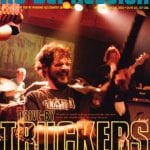Chapter and Verse
Forty Words For Fear, the new album from Madison Smartt Bell and Wyn Cooper, doesn’t sound anything like Nirvana. The music is dark, twisted acoustic-based blues along the lines of Los Lobos or Latin Playboys, and it comes by its narrative leanings honestly — Bell is an acclaimed novelist, while Cooper is a poet best-known for co-writing Sheryl Crow’s breakthrough 1994 hit “All I Wanna Do”.
Nevertheless, Forty Words For Fear might not exist at all if not for Nirvana. Some years back, Bell had a dream in which the late Kurt Cobain showed him how to play Nirvana’s “Lithium”. The short story Bell wrote about it turned into a novel, last year’s Anything Goes, about a touring rock band. In the course of writing the book, Bell asked his pal Cooper to write some song lyrics for the fictional band in the book. A number of Cooper-penned lyrics found their way into Anything Goes, most notably “Room Full Of Tears”. Then Bell started setting Cooper’s lyrics to music, and the songs quickly grew beyond the book.
“Pretty early on, I also started writing other lyrics, not necessarily to be ‘sung’ by the band in the book,” says Cooper. “Lyrics kept coming out, and I didn’t want to stop them. All along, I thought maybe we could do something with these songs that wouldn’t necessarily have anything to do with the book. So we started making demos.”
That led to a deal with North Carolina-based Gaff Music (a new label run by Scott Beal, a book collector and longtime fan of Bell’s writing), which is releasing Forty Words For Fear. Don Dixon produced the album with Mitch Easter engineering, but don’t expect anything that sounds like the most famous Dixon/Easter collaboration, R.E.M.’s Murmur.
“Madison is extremely talented, but he’s not one of those guys who can just do anything,” says Dixon. “A lot of what they did on the demos was kind of amateurish. I thought we could take the core of the songs and present them real differently without changing the songs at all — just the arrangements and feel. We were looking for almost mantra-like, repetitious grooves these songs could sit on top of.”
In that sense, Dixon’s longtime drummer Jim Brock emerges as the star of Forty Words For Fear. A large part of the album’s story happens at gut level, from the heartbeat pulse of Brock’s menacing grooves and rhythms. Brock’s drumming wouldn’t sound out-of-place behind Tom Waits, and it perfectly complements the down-and-out spiritual exhaustion of Bell’s gruff character-actor voice.
“In certain ways, Jim was as strong an influence as Don because of his rhythms,” says Bell. “They managed to get stuff out of these songs that I didn’t even know was there. That’s Don’s real genius, which all producers try for, but he’s just unusually good at it. And it’s also what I try to do as a writing teacher. But I would like to note something for the record: I still find the idea of myself as a singer kind of hard to take.”
Most of the album’s songs take place in seedy settings, such as the Detroit strip joint in the opening “On 8 Mile” (Cooper would like it known that this song predates rapper Eminem’s movie 8 Mile) and various drinking establishments. The music is highly cinematic, and would make a dandy soundtrack for a noir-ish movie along the lines of The Grifters.
Somewhat reluctantly, Cooper wound up with his voice on the record, too. Forty Words For Fear has a couple of spoken-word interludes, Cooper reading poetry accompanied by everything from radio static to clattering salt and pepper shakers. Dixon also got in on the album’s spoken-word program with “The Here Below”, murmuring an excerpt from Cooper’s poem “The Country Of Here Below” as an introduction.
“After we left the studio one night, Don stayed up all night working,” Cooper says. “He recorded himself reading that, and played it for us the next day. It was really beautiful, just stunning. Madison had a tear in his eye. ‘Wow,’ I said, ‘that’s an incredible poem. Where’d you find that?’ And Don said, ‘That’s one of YOURS, you idiot!’
“The more I heard how good the music was turning out, the less I wanted to have any poems read by me mixed in. It seemed silly to put a poem in there that some people might not want to listen to as much as the songs. But everybody insisted, Don especially. He was very down on any kind of talk about ‘commercial appeal.’ Don doesn’t get riled up about much, but he definitely did about that. ‘Look,’ he said, ‘we’re trying to make a good goddamn record, okay?!'”
Mission accomplished.




